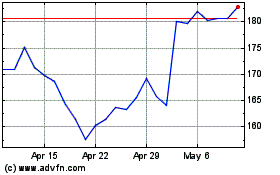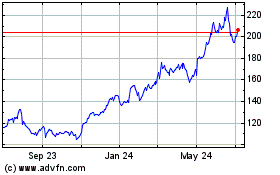Federal Trade Commission Files Antitrust Lawsuit Against Qualcomm -- Update
January 17 2017 - 6:21PM
Dow Jones News
By Brent Kendall
WASHINGTON -- The Federal Trade Commission on Tuesday sued
Qualcomm Inc., alleging the chip maker engaged in unlawful tactics
to maintain its monopoly on a semiconductor device used in
cellphones.
The FTC, in a suit filed in a California federal court, alleged
that Qualcomm used its position as the dominant provider of
baseband processors, devices that enable cellular communications,
to impose onerous terms on phone manufacturers and hobble
competitors.
Qualcomm won't sell its processors unless a customer agrees to
the company's preferred patent-licensing terms, which forces phone
makers to pay elevated royalties to Qualcomm when they use a
competitor's chips, the FTC alleged.
The commission also alleged that Qualcomm wrongly refused to
license its "standard-essential" patents to competitors despite an
obligation to do so. The lawsuit additionally alleged that a
Qualcomm exclusive deal with device maker Apple Inc. harmed
competition.
"Qualcomm has engaged in exclusionary conduct that taxes its
competitors' baseband processor sales, reduces competitors' ability
and incentive to innovate, and raises prices paid by consumers for
cell phones and tablets," the FTC said in its court filing.
The suit asks a federal judge to prohibit the alleged conduct
and to take actions to restore a competitive landscape. The suit
also seeks "redress" for Qualcomm's alleged violations, which
potentially would allow a judge to impose monetary penalties.
Qualcomm couldn't immediately be reached to comment.
The FTC's action came on a 2-1 partisan vote in the waning days
of a Democratic majority at the commission. Current FTC Chairwoman
Edith Ramirez, an Obama appointee, announced last week that she
would step down Feb. 10.
The FTC's current lone Republican, Commissioner Maureen
Ohlhausen, dissented from the filing of the lawsuit. She is likely
to become acting head of the agency after President-elect Donald
Trump takes office.
The FTC normally has five members but has been operating with
only three commissioners for nearly a year. When Ms. Ramirez
leaves, the FTC will have three vacancies. It could take months for
the Trump Administration to fill those openings, but an eventual
Republican-majority at the FTC would potentially have the ability
to take a different course of action regarding Qualcomm.
In the intervening months, the lawsuit could leave Ms. Ohlhausen
overseeing a case she didn't support.
In dissent, she said the lawsuit "lacks economic and evidentiary
support" and would "undermine U.S. intellectual property rights in
Asia and worldwide."
The FTC's probe of Qualcomm has been long-running, but
commission staffers only finished their investigation recently, and
that is why the lawsuit came so late in Ms. Ramirez's tenure,
according to a person familiar with the matter.
Write to Brent Kendall at brent.kendall@wsj.com
(END) Dow Jones Newswires
January 17, 2017 18:06 ET (23:06 GMT)
Copyright (c) 2017 Dow Jones & Company, Inc.
QUALCOMM (NASDAQ:QCOM)
Historical Stock Chart
From Aug 2024 to Sep 2024

QUALCOMM (NASDAQ:QCOM)
Historical Stock Chart
From Sep 2023 to Sep 2024
